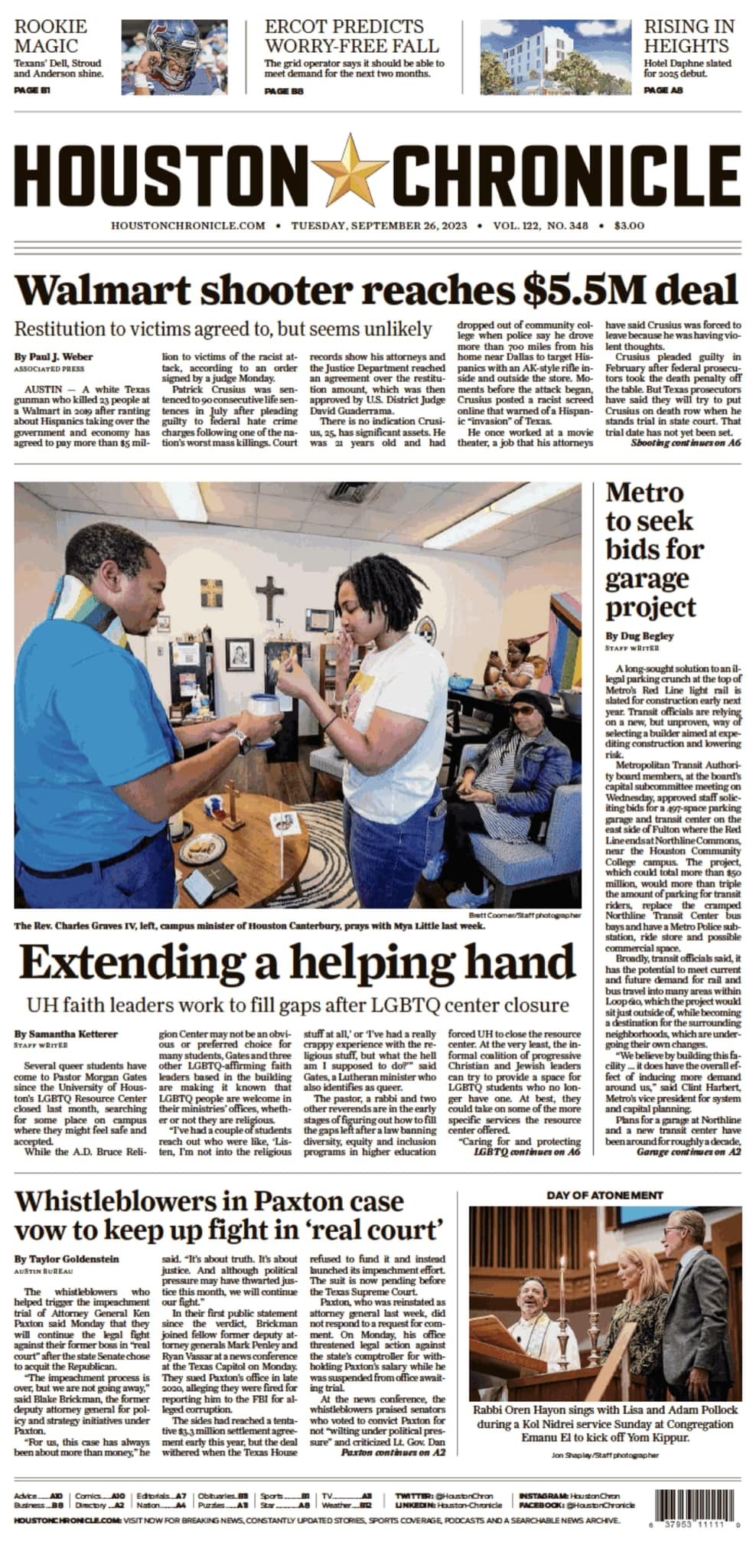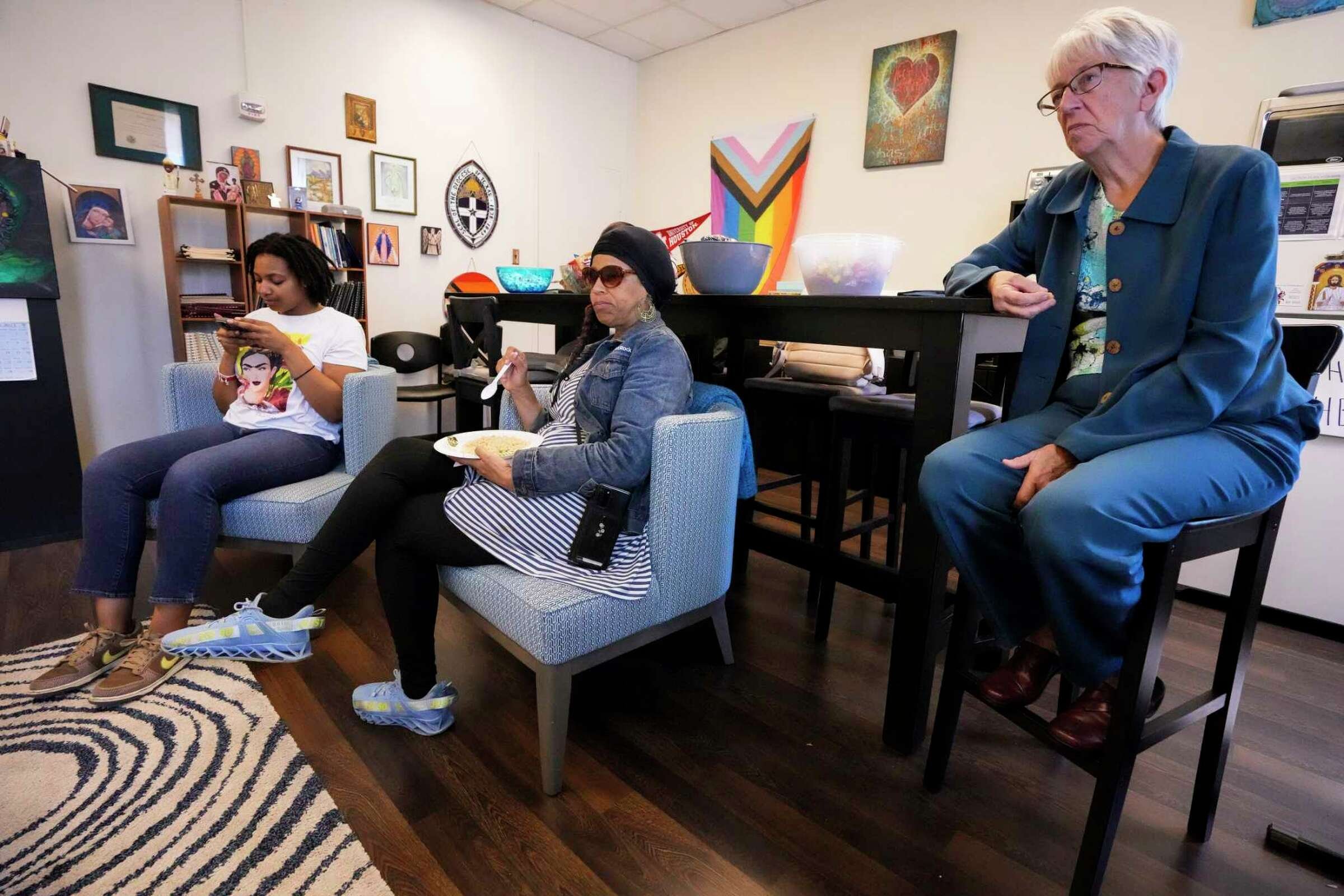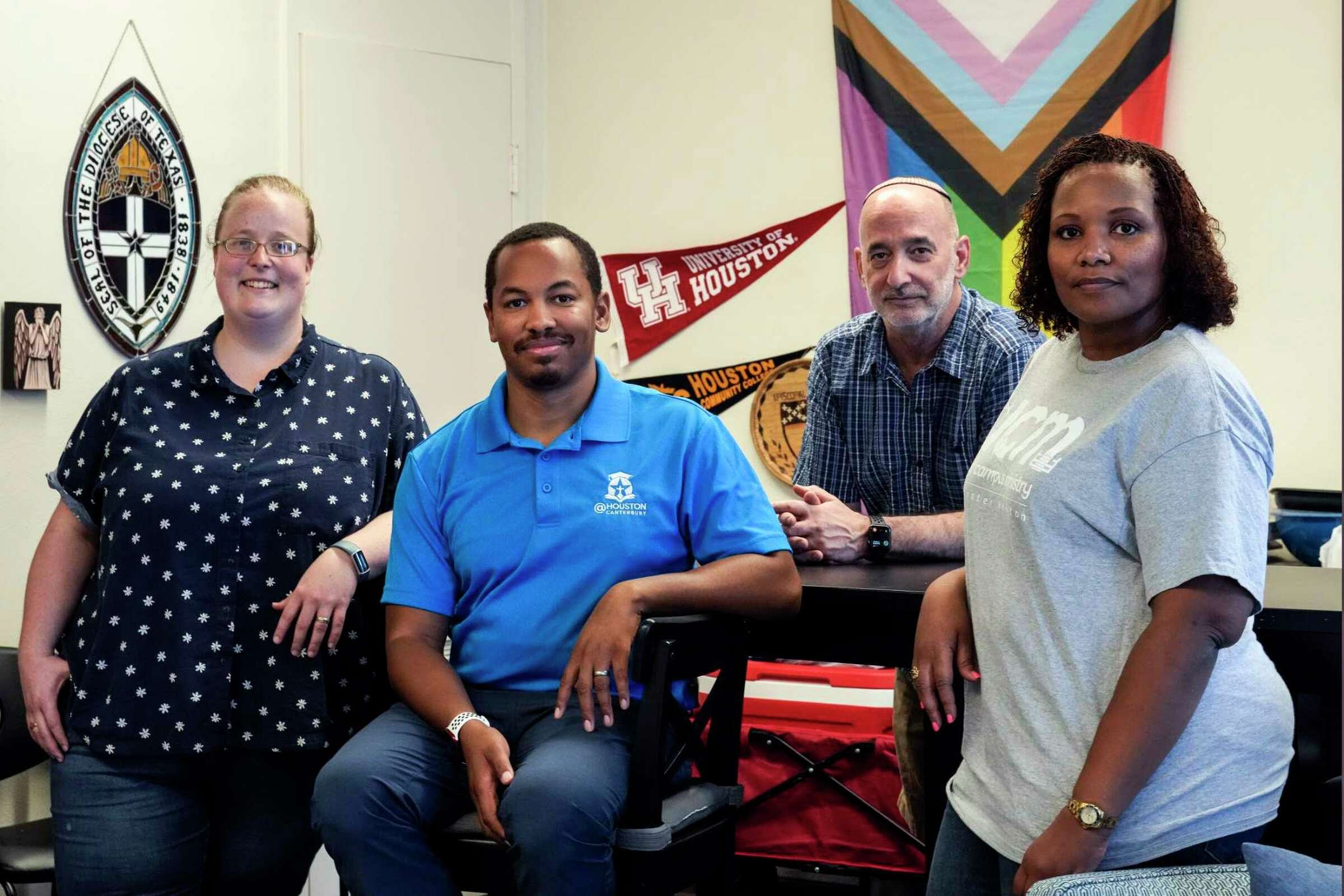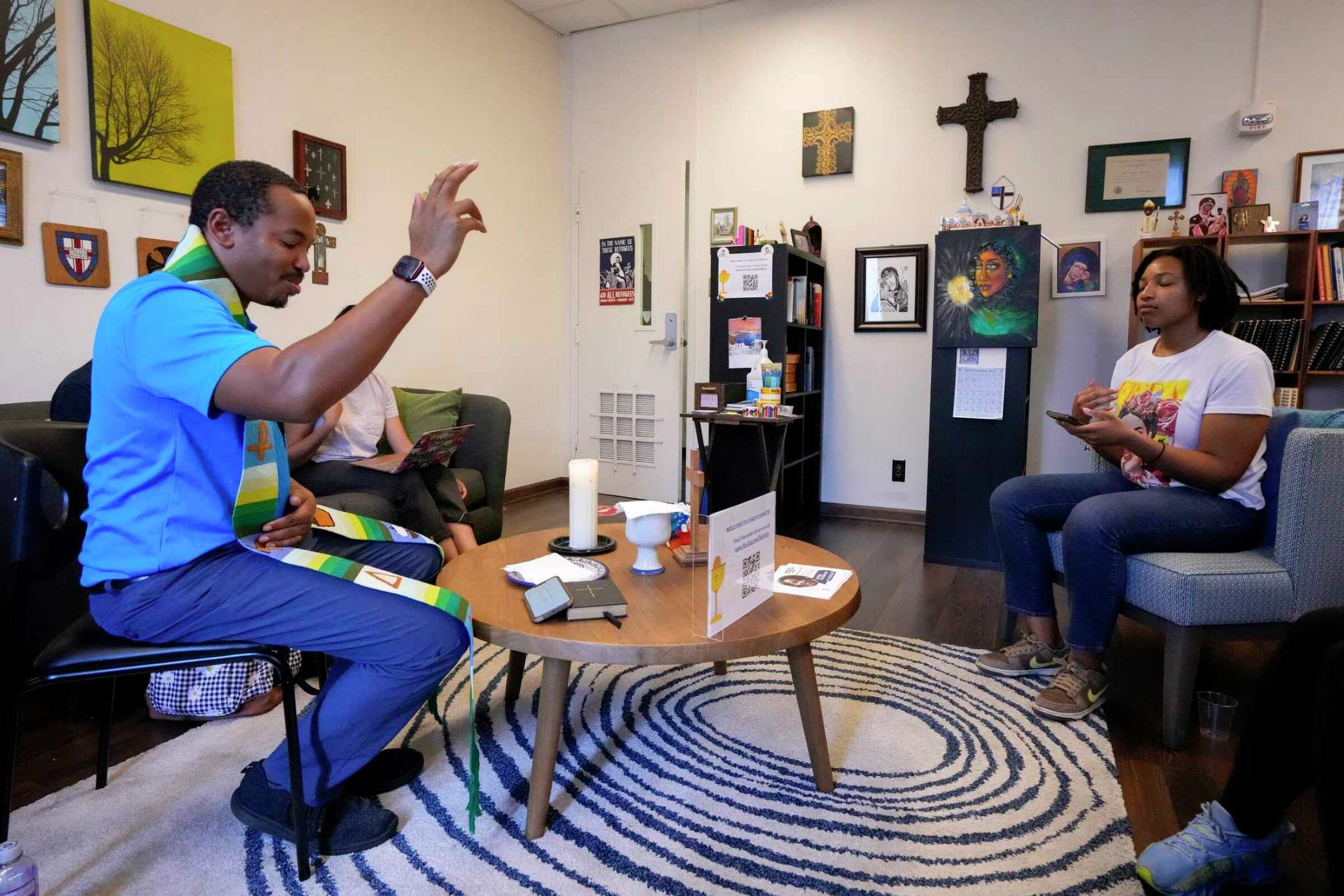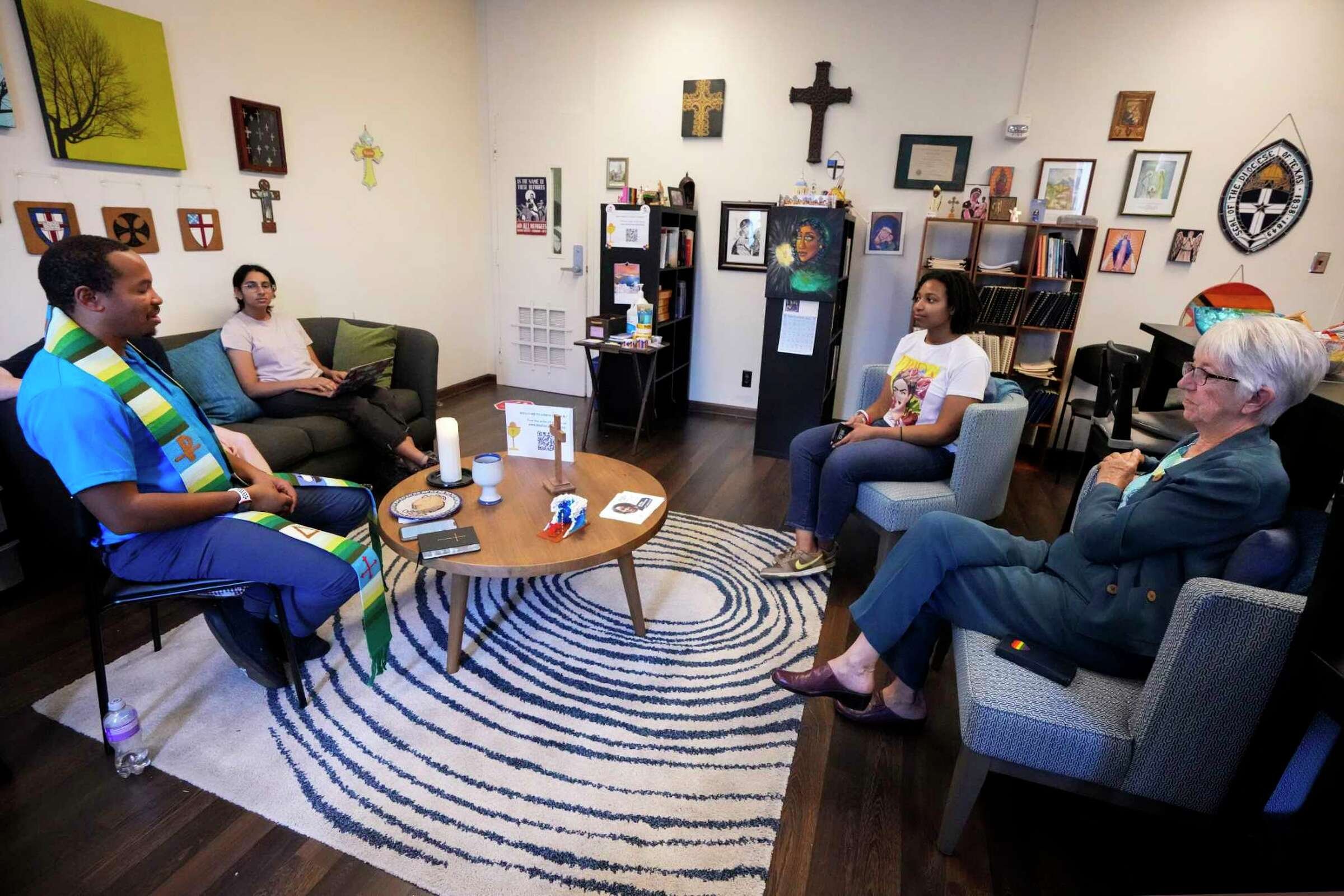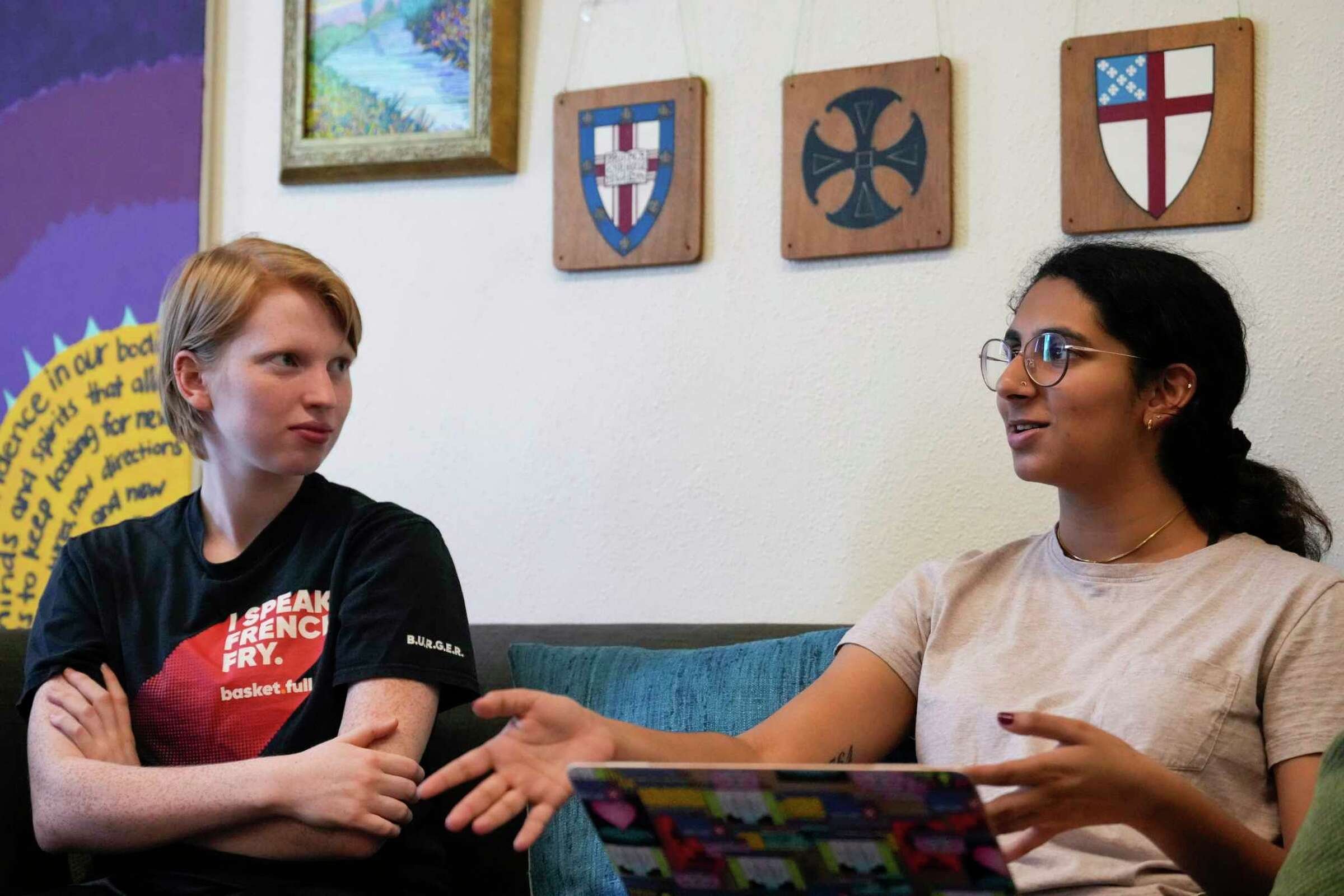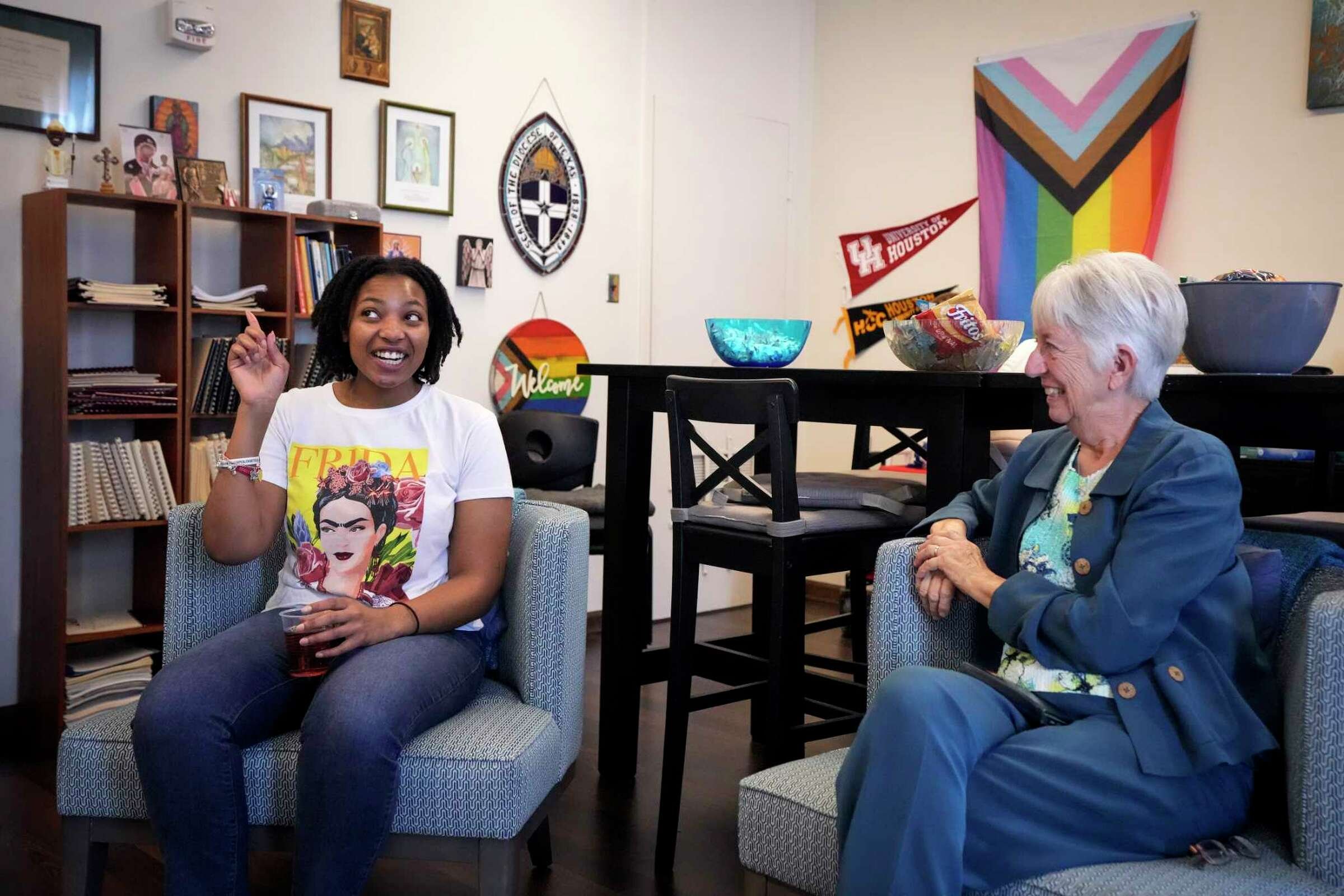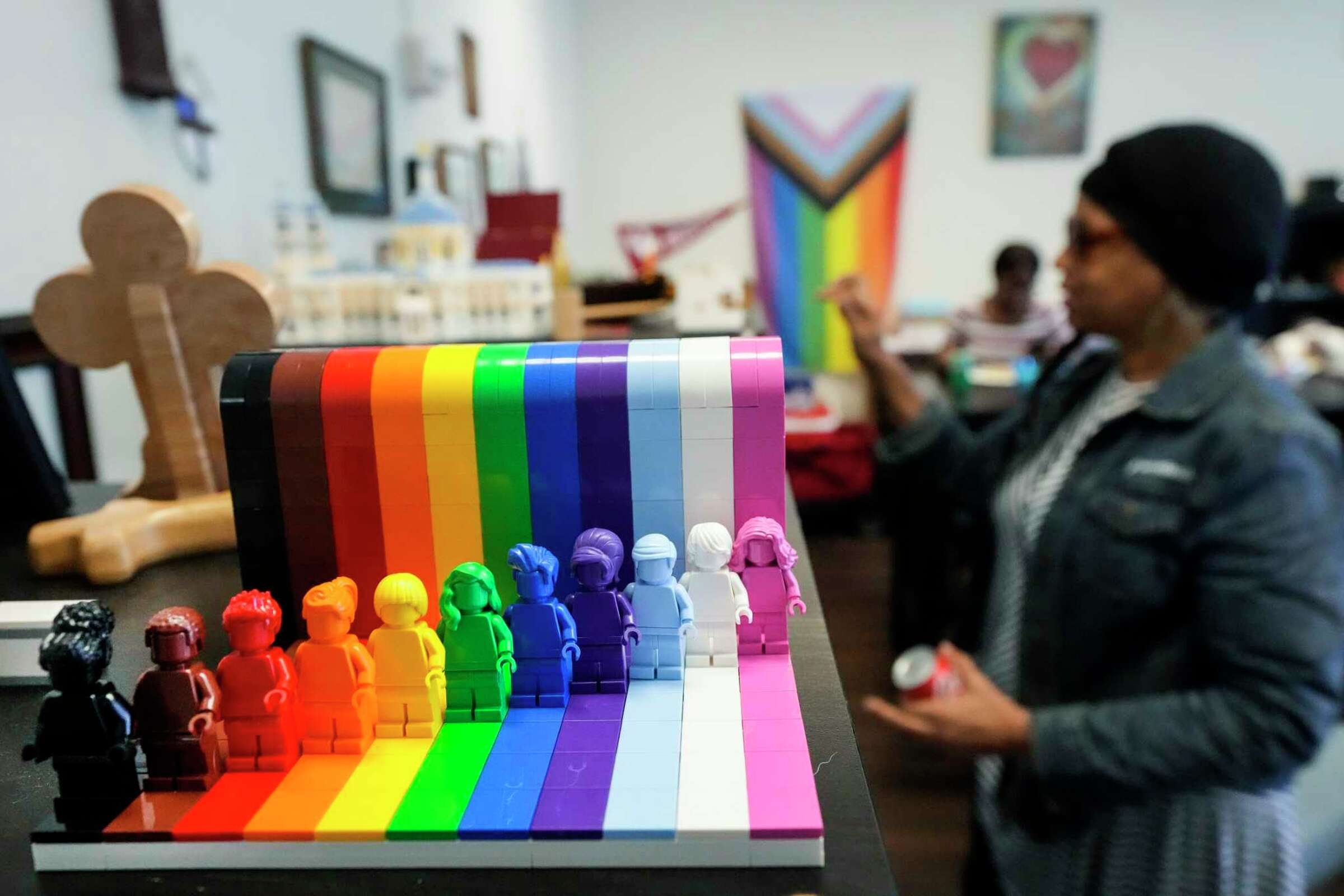
LGBTQ students at the University of Houston lost their safe space. Affirming faith leaders want to help.
LGBTQ students at the University of Houston lost their safe space. Affirming faith leaders want to help.
Samantha Ketterer, Staff writer
Sep. 22, 2023
You can find the full article on the Chronicle website here (with paywall) or in PDF here (without paywall)
Image above: A rainbow Lego piece is shown on the shelves during a session of Lunch Church at Noon in the Canterbury Room for a Bible study meeting Wednesday, Sept. 20, 2023 in Houston. Several LGBTQ-affirming religious leaders at University of Houston continue to serve students in a hope to fill the gap left by the closure of the campus LGBTQ Resource Center.
Cover image of the Houston Chronicle print edition, September 25th, 2023
Several queer students have come to Pastor Morgan Gates since the University of Houston’s LGBTQ Resource Center closed last month, searching for some place on campus where they might feel safe and accepted.
While the A.D. Bruce Religion Center may not be an obvious or preferred choice for many students, Gates and three other LGBTQ-affirming faith leaders based in the building are making it known that LGBTQ people are welcome in their ministries’ offices, whether or not they are religious.
“I’ve had a couple of students reach out who were like, ‘Listen, I’m not into the religious stuff at all,’ or ‘I’ve had a really crappy experience with the religious stuff, but what the hell am I supposed to do?’” said Gates, a Lutheran minister who also identifies as queer.
The pastor, a rabbi and two other reverends are in the early stages of figuring out how to fill the gaps left after a law banning diversity, equity and inclusion programs in higher education forced UH to close the resource center. At the very least, the informal coalition of progressive Christian and Jewish leaders can try to provide a space for LGBTQ students who no longer have one. At best, they could take on some of the more specific services the resource center offered.
“Caring for and protecting and looking after queer students is part of each of our respective obligations as religious people and religious leaders,” said Rev. Charles Graves IV, an openly gay Episcopalian pastor. “This is our religious call, and we're willing to step up to the plate.”
Gates and Graves have sometimes collaborated as the respective campus ministers of Houston Area Campus Ministry ELCA and Houston Canterbury. They say they naturally work well with the two other LGBTQ-affirming groups in the A.D. Bruce Religion Center, Rev. Tamika Nelson’s United Campus Ministry of Greater Houston and Rabbi Kenny Weiss’ Houston Hillel. Their groups tend to have smaller numbers of core members, even if many come and go.
Trying to help more LGBTQ students shouldn’t be much of a leap for the rabbi and pastors. The three Christian ministries market themselves as LGBTQ-affirming, so a majority of the students they serve are queer. Hillel has been less overt with marketing but has been an inherently accepting place for the queer community, Weiss said.
Speaking to nonreligious students about LGBTQ issues also isn't new, as the ministers often interact with students who just need someone to talk to. And in Weiss’ case, most of the students he serves aren’t religious but are culturally Jewish.
Getting people to trust faith leaders when they have felt burned by religion is the greater challenge, Graves said.
"We have to be careful, because lots of churches ... will say, 'All are welcome,'" the pastor said in his office with the other affirming leaders. "But a lot of queer students have found that to mean you all may be welcome, but eventually you're going to get pulled aside by somebody and they're going to say that your lifestyle is unacceptable."
"Welcoming is different than belonging," Weiss said.
Responding to the law
AJ, a UH student who asked not to be identified by her last name for privacy reasons, embraced Canterbury as a safe space early in college. Some people in the four allied groups are straight, but they’re all affirming – and AJ said she hopes other queer students can feel comfortable walking into the Religion Center now that they don’t have the LGBTQ resource center to turn to.
“It’s just a really pretty building with really nice people,” she said.
Kaitie Tolman has already leaned on Graves once after coming across a preacher on campus who spoke hatefully about the queer community – in this case, a protected form of speech. Tolman is president of the LGBTQ student organization GLOBAL and leads a pagan and witchcraft student group, but they appreciated that Graves met up to offer support.
“A lot of people think we are hating of religion, and it’s the same thing in reverse, they don’t realize y’all are LGBT friendly,” Tolman said last week in the Canterbury office. “It would be awesome to do stuff, however y’all can help.”
The four affirming religious leaders at UH are still deciphering the Texas law that is gutting diversity, equity and inclusion, or DEI, trainings and programs at public colleges and universities. The decision to close the resource center caught many queer groups by surprise, in part because universities have until Jan. 1 to enact Senate Bill 17. And the law’s colloquial naming as the “DEI bill” meant its implications for the LGBTQ population were initially less clear than for UH’s Center for Diversity and Inclusion, which also shut its doors.
The university replaced both centers with the broader Center for Student Advocacy and Community, which provides an array of services and can still serve individual LGBTQ people and racial or ethnic minorities. It’s not yet known whether any services from the two former resource centers will return, but they couldn’t be exclusive to any group – the law dictates that programs offered by state-funded universities are race-neutral or independent of other identity markers such as sexual orientation.
Student organizations are exempt from SB 17 and are natural choices to pick up the slack, although leaders like Tolman say they are looking for help since they are limited in time and money. Early aid arrived from Rice University’s LGBTQ student group, which is granting “honorary membership” to public university students affected by the law. UH’s LGBTQ Alumni Association is also looking at how to pitch in.
Graves said he would especially like the affirming ministries to take over the administrative capacity of “Rainbow Chats,” one of the resource center’s signature programs that offered cross-sections of the LGBTQ population the ability to interact in a comfortable space. One support group for UH students who commute helped people who might be openly queer at school and closeted at home, for example.
But the three pastors and rabbi are first making sure they can legally offer some of the programs as private citizens using a university building. The faith leaders sign annual memorandums of understanding to utilize the religion center, meaning they’re unsure if they must adhere to other university policies. The multifaith space at UH is also an anomaly in higher education, complicating the issue even more.
The law is known to have strict repercussions for university employees who violate SB 17, Weiss said, so it doesn’t allow room for experimentation. Once they get legal approval, then they'll discuss how to move forward.
“It becomes ambiguous when we as campus ministers get involved and even more ambiguous when it's those of us who are campus ministers who have a ministry with a historical space in this building,” Weiss said.
For now, the four faith leaders are making themselves available to students. Nelson, of United Campus Ministry, said she hopes she is inviting enough for students so they might be able to come and deconstruct any issues they might have with religious spaces.
“Language means a lot,” she said. "You say, 'I care about you as an individual.'"
Alec Minney, a member of GLOBAL, said they already spoke to one of the ministers about using their space but still left feeling skeptical. Minney detected good intentions but said they would worry about religion being slipped into future conversations. Some of the surrounding ministries in the building are not affirming, and the affirming ministry offices might still have religious iconography, like a kaleidoscope portrait of Jesus hanging on the wall in Houston Canterbury.
“I personally would feel a lot less comfortable than I was when the school was providing (the space),” Minney said. “Religion just kind of permeates the atmosphere without them realizing it.”
Minney hasn’t decided whether they would check out the ministries in the religion center.
“I’m not sure,” they said. “I probably wouldn’t, but I’d consider it.”
Mya Little, left, Vicki Arthur and Sara McNeil participate in a scripture discussion at Lunch Church at Noon in the Canterbury Room for a Bible study meeting Wednesday, Sept. 20, 2023 in Houston. Several LGBTQ-affirming religious leaders at University of Houston continue to serve students in a hope to fill the gap left by the closure of the campus LGBTQ Resource Center.
Pastor Morgan Gates, campus pastor for HouMin - ECLA, left, The Rev. Charles Graves IV, campus minister, Houston Canterbury, Rabbi Kenny Weiss, executive director, Houston Hillel, and The Rev. Tamika Nelson, executive director, United Campus Ministry of Greater Houston, pose for a photo following a meeting of Lunch Church at Noon in the Canterbury Room for a Bible study Wednesday, Sept. 20, 2023 in Houston. Several LGBTQ-affirming religious leaders at University of Houston continue to serve students in a hope to fill the gap left by the closure of the campus LGBTQ Resource Center.
The Rev. Charles Graves IV, campus minister Houston Canterbury, left, prays with Mya Little during Lunch Church at Noon in the Canterbury Room Wednesday, Sept. 20, 2023 in Houston. Several LGBTQ-affirming religious leaders at University of Houston continue to serve students in a hope to fill the gap left by the closure of the campus LGBTQ Resource Center.
The Rev. Charles Graves IV, campus minister Houston Canterbury, far left, leads bible study during Lunch Church at Noon in the Canterbury Room Wednesday, Sept. 20, 2023 in Houston. Several LGBTQ-affirming religious leaders at University of Houston continue to serve students in a hope to fill the gap left by the closure of the campus LGBTQ Resource Center.
Ash Cobb, left, and AJ participate in a scripture discussion during a Bible study at Lunch Church at Noon in the Canterbury Room Wednesday, Sept. 20, 2023 in Houston. Several LGBTQ-affirming religious leaders at University of Houston continue to serve students in a hope to fill the gap left by the closure of the campus LGBTQ Resource Center.
Mya Little, left, Vicki Arthur and Sara McNeil participate in a scripture discussion at Lunch Church at Noon in the Canterbury Room for a Bible study meeting Wednesday, Sept. 20, 2023 in Houston. Several LGBTQ-affirming religious leaders at University of Houston continue to serve students in a hope to fill the gap left by the closure of the campus LGBTQ Resource Center.


